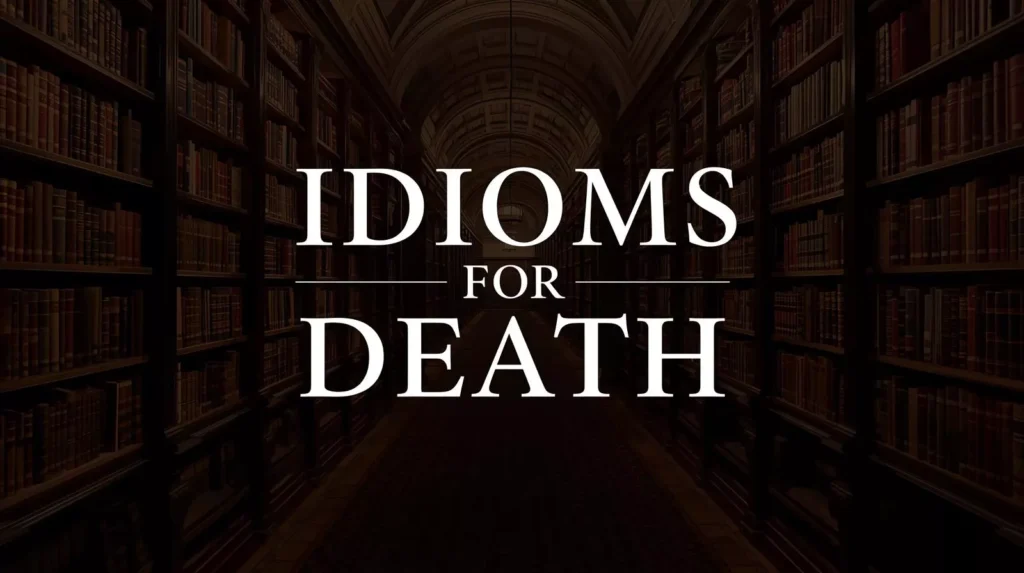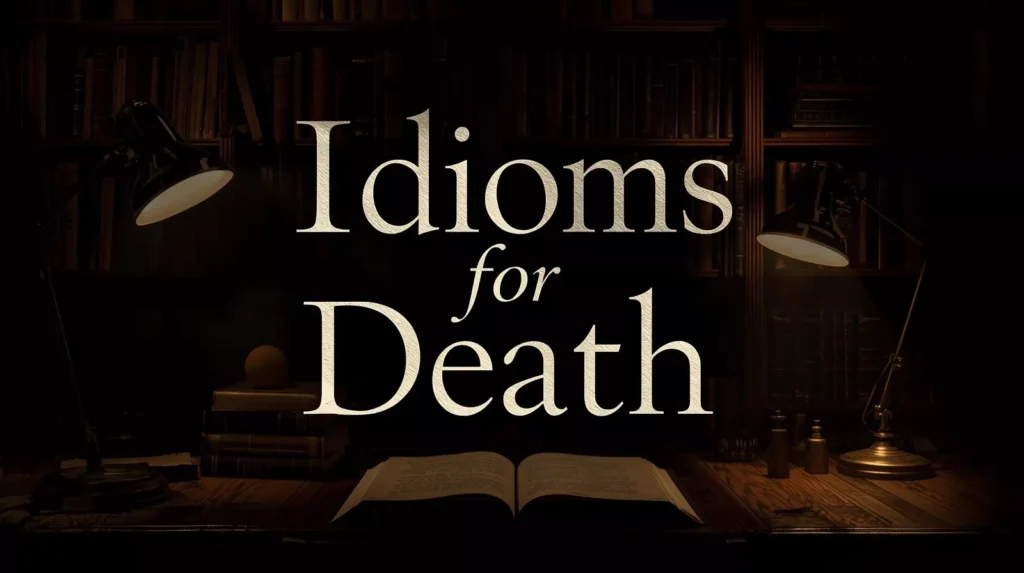Idioms for Death – Timeless Sayings About Life’s End

Death, though a universal reality, is often approached with sensitivity and emotion in language. Idioms related to death provide a figurative and often softer way to discuss this difficult subject, reflecting the cultural attitudes, beliefs, and humor surrounding it. Rather than simply saying someone “died,” these expressions such as “kick the bucket” or “pass away,” convey tone, emotion, and context. They help speakers navigate conversations about loss with empathy and creativity, blending seriousness, respect, and sometimes even humor.
What Are Idioms for Death?
Idioms for death are figurative expressions used to describe the end of life in a more creative, indirect, or sensitive way. Instead of stating that someone has “died,” these idioms such as “passed away,” “gone to a better place,” or “kicked the bucket,” use metaphor and imagery to soften the harshness of the topic. They can convey different tones, from respectful and solemn to humorous or casual, depending on the context. Such expressions not only enrich the language but also reflect cultural attitudes toward mortality and the ways people cope with loss.

Commonly Used Idioms for Death
- Pass away – A polite and gentle way to say someone has died.
Example: Her grandmother passed away peacefully last night. - Kick the bucket – A humorous slang term meaning to die.
Example: He finally kicked the bucket after years of illness. - Bite the dust – Means to die or be defeated.
Example: Many soldiers bit the dust in the battle. - Meet one’s maker – Refers to dying and facing judgment.
Example: The old man felt he was about to meet his maker. - Give up the ghost – Means to die or stop functioning.
Example: The old engine finally gave up the ghost. - Go to a better place – Suggests dying and going to heaven.
Example: She’s gone to a better place now. - Breathe one’s last – To take the final breath before dying.
Example: The patient breathed his last surrounded by family. - Cross the great divide – Refers to moving from life to death.
Example: He crossed the great divide after a long illness. - Rest in peace – A phrase wishing peace for someone who has died.
Example: May the souls of the departed rest in peace. - Depart this life – A formal expression for dying.
Example: The actor departed this life at the age of 85. - Go the way of all flesh – Means to die, as all living things eventually do.
Example: We all must go the way of all flesh someday. - Be at peace – Refers to being free from pain after death.
Example: After years of suffering, she’s finally at peace. - Join the great majority – An old-fashioned expression meaning to die.
Example: The poet joined the great majority in 1910. - Pay the ultimate price – To die for a noble cause.
Example: Soldiers pay the ultimate price for their country. - Go under – Means to die or sink metaphorically.
Example: Many sailors went under in the storm. - Go west – British slang for dying.
Example: Many young men went west during the war. - Sleep the eternal sleep – A poetic euphemism for death.
Example: He now sleeps in eternal sleep. - Leave this world – Means to die.
Example: She left this world too soon. - Meet the grim reaper – To face death personified.
Example: He met the grim reaper in a tragic accident. - Be six feet under – Refers to being dead and buried.
Example: He’s been six feet under for years. - Push up daisies – To be buried in the ground after death, humorously.
Example: Someday we’ll all be pushing up daisies. - Cash in one’s chips – From gambling slang, meaning to die.
Example: He cashed in his chips at age 90. - Be called home – To die and return to God.
Example: The pastor was called home peacefully. - Go to one’s eternal rest – A formal way to say someone has died.
Example: May he go to his eternal rest. - Be no more – A gentle expression meaning someone has died.
Example: The king is no more. - Be gone – To have died or passed away.
Example: She’s been gone for many years now. - Draw one’s last breath – To take the final breath before death.
Example: The old man drew his last breath at dawn. - Pass on – Another polite way to say die.
Example: He passed on in his sleep. - Lay down one’s life – To die for a noble or heroic reason.
Example: He laid down his life for his comrades. - Check out – Informal slang meaning to die.
Example: He checked out after a long illness. - Flatline – To die, medically referring to a stopped heartbeat.
Example: The doctor said he flatlined at midnight. - Be taken from us – A sympathetic way to refer to someone’s death.
Example: She was taken from us too soon. - Lose one’s life – To die, often suddenly or tragically.
Example: Many lost their lives in the earthquake. - Go to the other side – A spiritual way of saying someone has died.
Example: He’s gone to the other side now. - Pass to the great beyond – Means to die or move on spiritually.
Example: The legend has passed to the great beyond. - Join the angels – A gentle phrase for death, often used for children.
Example: Their baby joined the angels last year. - Fade away – To die gradually or weaken until death.
Example: The singer faded away after a long illness. - Go home to God – To die and return to the divine.
Example: She went home to God peacefully. - Be in a better place – Means being free from pain after death.
Example: He’s in a better place now. - Rest with the ancestors – Used in some cultures to mean joining those who came before.
Example: The chief now rests with the ancestors. - Be lost to the world – To die or disappear permanently.
Example: The explorer was lost to the world forever. - Go silent – Means to die or cease responding.
Example: The old poet went silent forever. - Answer the final call – A formal expression for death.
Example: The sailor answered the final call. - Fall asleep forever – A gentle way to describe peaceful death.
Example: The child fell asleep forever in her mother’s arms. - Be taken away – To die suddenly or unexpectedly.
Example: Our friend was taken away too soon. - Pass beyond the veil – To die and cross into the spiritual realm.
Example: She passed beyond the veil at dawn. - Say goodbye to the world – To die.
Example: He said goodbye to the world after a long struggle. - Join the departed – To die and join others who have passed.
Example: He joined the departed souls yesterday. - Be gone to glory – To die and go to heaven.
Example: The old preacher has gone to glory. - Expire – A formal or medical term meaning to die.
Example: The patient expired at 10:30 a.m.
Rare and Unique Idioms for Death
- Take a long sleep – To die and rest permanently.
Example: After years of wandering, he took the long sleep. - Go into the light – To die and enter the afterlife.
Example: She felt ready to go into the light. - Become stardust – To die and return to nature or the universe.
Example: “We are all stardust,” he said before he became it. - Drop off the perch – Australian slang for dying.
Example: The old bloke finally dropped off the perch. - Climb the golden staircase – To go to heaven.
Example: She’s climbed the golden staircase to heaven. - Lay down the burden – To die and find peace after struggle.
Example: After years of hardship, he laid down the burden. - Slip the mortal coil – Shakespearean phrase meaning to escape earthly life through death.
Example: He slipped the mortal coil at sunset. - Join the choir invisible – A poetic expression for death.
Example: The poet has joined the choir invisible. - Catch the last train – To die or depart this life.
Example: He caught the last train last night. - Go to one’s reward – To die and receive divine recompense.
Example: The kind woman went to her reward.
Read: Idioms For Getting Married
Death Idioms in Literature and Pop Culture
- Shuffle off this mortal coil – From Shakespeare’s Hamlet, meaning to die and leave behind life’s troubles.
Example: “To die, to sleep, to shuffle off this mortal coil.” - Join the choir invisible – From George Eliot’s poem, meaning to die and live on through influence or memory.
Example: “He has joined the choir invisible.” - Gone with the wind – From Margaret Mitchell’s novel, meaning to vanish or die.
Example: The old traditions are gone with the wind. - The last enemy – From the Bible, representing death as the final obstacle.
Example: “He faced the last enemy with courage.” - Rest in peace – A traditional epitaph phrase wishing peace in death.
Example: The tombstone read “Rest in Peace.” - Dance with death – To confront or risk death.
Example: The hero danced with death on the battlefield. - Death knocks – From Woody Allen’s play, meaning the inevitable arrival of death. Example: “When death knocks, no one can refuse.”
- The Grim Reaper calls – Refers to death personified arriving.
Example: “When the Grim Reaper calls, no one hides.” - Reap what you sow – A biblical metaphor meaning death or downfall as the result of one’s actions.
Example: “He reaped what he sowed after years of crime.” - The final curtain – A theatrical metaphor for life’s end.
Example: “When the final curtain falls, we all take a bow.”

Synonyms and Alternatives for Death
| Synonym | Meaning |
|---|---|
| Demise | A formal or polite word for death, often used in news or official contexts. |
| Passing | A gentle euphemism for death, emphasizing peace and transition rather than finality. |
| Departure | Refers to leaving life, highlighting movement from one state to another. |
| End | A straightforward term for the conclusion of life. |
| Expiration | A clinical or formal term often used in medical settings, meaning the cessation of life. |
| Decease | A formal and somewhat legal term for death. |
| Loss | Focuses on the emotional impact on those left behind rather than the act of dying. |
| Rest | Suggests eternal peace or relief from suffering after death. |
| Passing away | A soft, sympathetic way of saying someone has died, common in everyday speech. |
| End of life | Used in philosophical, spiritual, or healthcare discussions about the final stage of living. |
Tips for Using Death Idioms in Writing and Speech
- Match the Tone to the Context
Choose idioms that suit the mood, use “passed away” or “at peace” for sensitive situations, and “kick the bucket” or “bite the dust” in casual or humorous contexts. - Use Figurative Language Thoughtfully
Avoid overusing death idioms in serious writing; one well-chosen idiom can convey emotion more effectively than several forced ones. - Reflect Cultural Sensitivity
Remember that idioms about death can carry cultural or religious meanings. Always consider your audience’s background and comfort level. - Balance Emotion and Clarity
While idioms soften harshness, don’t let them obscure meaning. Use them alongside clear language to ensure your message is understood. - Use Idioms to Add Depth, Not Distraction
In creative writing, idioms like “slip the mortal coil” or “join the choir invisible” can add poetic depth but should blend naturally with your narrative voice.
Read: Idioms For Culture
Read: Idioms For Joy
FAQs
Conclusion
Death is one of the few experiences shared by all living beings, and yet, it remains one of the most difficult topics to discuss. Idioms for death allow us to approach this sensitive subject with empathy, respect, and even a touch of creativity. From solemn phrases like “passed away” to lighthearted ones like “kick the bucket,” these expressions reflect not only language diversity but also human emotion and cultural perspective. Learning and using death-related idioms helps us express grief, acceptance, and remembrance in ways that feel natural and meaningful.
